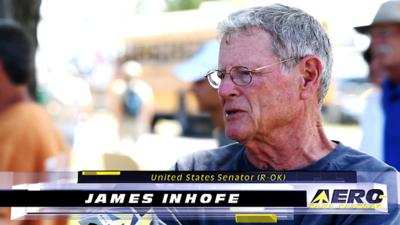Tue, Jul 01, 2014
Looking For Input From The Aviation Community For Follow-On Legislation
U.S. Sen. Jim Inhofe (R-OK), a member of the Senate General Aviation Caucus and certified flight instructor with more than 11,000 flight hours, on Monday announced the outline for Pilot’s Bill of Rights 2 (PBOR2) and requested the aviation community to submit comments for the final Senate legislation.

“The first Pilot’s Bill of Rights was a victory for the aviation community and made possible by the support of pilots and industry leaders across the nation,” said Inhofe in a news release. “Since its implementation, I have heard from the aviation community that more improvements still need to be made to cut red tape. The goal of Pilot’s Bill of Rights 2 is to continue addressing unfair practices and regulations toward the aviation industry. Today I unveiled my draft legislation for how to accomplish this goal, and I am also requesting feedback from the aviation community on how this legislation can best meet their needs and ensure a safe and innovative industry that is free of heavy-handed bureaucracy.”
Inhofe will also be hosting a forum at 10 a.m. on Aug. 2 at EAA AirVenture Oshkosh to discuss the legislation, receive feedback, and take questions.
Language in the bill would expands the FAA's 3rd class medical exemption for light sport aircraft to cover most small general aviation (GA) aircraft. It would also prohibit enforcement of violations if FAA has not complied with these provisions within 180 days of enactment. It would also reign in Customs and Border Patrol (CBP) stops and searches of GA by requiring CBP to follow general law enforcement standards when exercising its powers.
Other sections provide local airport offices the ability to manage the use of private hangars at airports. Current law gives federal officials and Washington the ability to dictate what does and doesn’t happen inside a hangar; this section changes that problem; and opens a dialogue on language that will make it easier to install new, safety enhancing equipment on existing aircraft without going through a lengthy, expensive certification process.
The follow-on bill also expands on the original Pilot’s Bill of Rights by explicitly stating that pilots facing an investigation by FAA can appeal the issue directly to a federal district court for a de novo trial. Inhofe said this provision of the original Pilot’s Bill of Rights has not operated as intended. It also expands the protections of the Pilot’s Bill of Rights to other certificate holders in the aviation community, such as charter operators or repair stations, and requires FAA to provide notification to an individual once they become subject to an FAA investigation; if FAA does not provide notification, they cannot press charges.
Others sections:
- Limit the scope of FAA’s document requests of certificate holders to the pertinent issues being investigated
- Reinstate the FAA’s expungement policy, preventing the agency from retaining records of enforcement against an airmen certificate holder after retaining it for 5 years. Also prohibits the retention of records beyond 90 days if the agency does not take enforcement action. Further prevents the FAA from publicizing pending enforcement actions against a covered certificate holder
- Prohibit enforcement of NOTAM violations if FAA has not finished its NOTAM improvement program by the end of the year.
- Require contract towers and other outsourced FAA programs to be subject to FOIA requests.
- Provides civil liability protection to aviation medical examiners and other FAA reps, treating them as government employees as the proscribed duties are carried out.
More News
“While legendary World War II aircraft such as the Corsair and P-51 Mustang still were widely flown at the start of the Korean War in 1950, a new age of jets rapidly came to >[...]
Decision Altitude (DA) A specified altitude (mean sea level (MSL)) on an instrument approach procedure (ILS, GLS, vertically guided RNAV) at which the pilot must decide whether to >[...]
Aero Linx: National Aviation Safety Foundation (NASF) The National Aviation Safety Foundation is a support group whose objective is to enhance aviation safety through educational p>[...]
Also: Cal Poly Aviation Club, $$un Country, Arkansas Aviation Academy, Teamsters Local 2118 In response to two recent general aviation accidents that made national headlines, more >[...]
“The FAA is tasked with ensuring our skies are safe, and they do a great job at it, but there is something about the system that is holding up the medical process. Obviously,>[...]
 Aero-News: Quote of the Day (04.28.25)
Aero-News: Quote of the Day (04.28.25) ANN's Daily Aero-Term (04.28.25): Decision Altitude (DA)
ANN's Daily Aero-Term (04.28.25): Decision Altitude (DA) ANN's Daily Aero-Linx (04.28.25)
ANN's Daily Aero-Linx (04.28.25) Airborne-Flight Training 04.24.25: GA Refocused, Seminole/Epic, WestJet v TFWP
Airborne-Flight Training 04.24.25: GA Refocused, Seminole/Epic, WestJet v TFWP Aero-News: Quote of the Day (04.29.25)
Aero-News: Quote of the Day (04.29.25)



